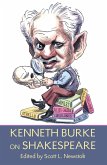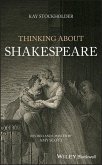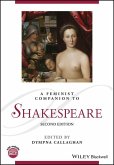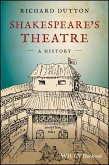HOW TO DO THINGS WITH SHAKESPEARE HOW TO DO THINGS WITH SHAKESPEARE "This is a companion to Shakespeare with a difference. Vive la différance!" DAVID BEVINGTON, UNIVERSITY OF CHICAGO "Doing things with literature: scholarly articles are not the only way to go. Aristotle uses a lecture, Horace a letter, Sidney a mock oration. Laurie Maguire and the contributors to this book engage in a genial conversation that invites students in. Like all good conversations, this one admits first-person candor, keeps things lively by changing the subject five times, welcomes disagreements, and waits for what the reader-listener is going to do in response." BRUCE SMITH, UNIVERSITY OF SOUTHERN CALIFORNIA, LOS ANGELES
Dieser Download kann aus rechtlichen Gründen nur mit Rechnungsadresse in D ausgeliefert werden.
"Maguire ... does not seek to force the essays into convenient (and conventional) critical boxes. Rather, she asks her contributors to open their essays with discussions of the questions and contexts that drove them to pursue their topic and then write about it. Highly recommended." (Choice Reviews, October 2008)"Doing things with literature: scholarly articles are not the onlyway to go. Aristotle uses a lecture, Horace a letter, Sidney a mockoration. Laurie Maguire and the contributors to this book engage ina genial conversation that invites students in. Like all goodconversations, this one admits first-person candor, keeps thingslively by changing the subject five times, welcomes disagreements,and waits for what the reader-listener is going to do inresponse."
-Bruce Smith, University of Southern California, LosAngeles
"This collection of essays on How To Do Things withShakespeare, edited by Laurie Maguire, takes a wonderfullyfresh and unusual approach to its subject. The essays aboutindividual works center in some cases on texts too often neglected:Cymbeline, Henry VIII, Love's Labour's Lost,The Two Gentlemen of Verona,and The Winter's Tale,along with the more familiar A Midsummer Night's Dream,The Merchant of Venice, and the Sonnets. The topics areequally arresting in their freshness of approach: how to do thingswith sources, history, texts, animals, posterity. Animals! This isMaguire's splendid approach to the question she has put to herself,what the next stage in 'body' criticism might be. To provide ananswer, she calls on Erica Fudge to ask such questions as, Cananimals feel shame? Can they lose bladder control? as in the caseof Lance's fabulous dog in The Two Gentlemen. Paul Yachninaddresses such puzzles by thinking about Renaissance ideas of sheepand what they can tell us about personhood. The question, How to dothings with texts? is perhaps less off-beat, but it here producesno less innovative answers from Tiffany Stern: not the usualexplanation of how quartos differ from folios and all that, butinstead pioneering textual analysis of how the language of books isused to describe staging, and, conversely, how the language of thestage can be used to describe reading. Anthony Dawson asks in whatway our thinking about the nature of texts has changed in recentyears and how that change affects the actual process of editing.Source study is rescued from the low estate into which it hasfallen recently by three new and flexible ways of thinking aboutinfluence. Similar pairings of approaches offer delight andrevelation about every topic in this engaging and highly readablebook. The studies are admirably cross-disciplinary andcross-cultural. This is a companion to Shakespeare with adifference. Vive la différance!"
-David Bevington, University of Chicago
-Bruce Smith, University of Southern California, LosAngeles
"This collection of essays on How To Do Things withShakespeare, edited by Laurie Maguire, takes a wonderfullyfresh and unusual approach to its subject. The essays aboutindividual works center in some cases on texts too often neglected:Cymbeline, Henry VIII, Love's Labour's Lost,The Two Gentlemen of Verona,and The Winter's Tale,along with the more familiar A Midsummer Night's Dream,The Merchant of Venice, and the Sonnets. The topics areequally arresting in their freshness of approach: how to do thingswith sources, history, texts, animals, posterity. Animals! This isMaguire's splendid approach to the question she has put to herself,what the next stage in 'body' criticism might be. To provide ananswer, she calls on Erica Fudge to ask such questions as, Cananimals feel shame? Can they lose bladder control? as in the caseof Lance's fabulous dog in The Two Gentlemen. Paul Yachninaddresses such puzzles by thinking about Renaissance ideas of sheepand what they can tell us about personhood. The question, How to dothings with texts? is perhaps less off-beat, but it here producesno less innovative answers from Tiffany Stern: not the usualexplanation of how quartos differ from folios and all that, butinstead pioneering textual analysis of how the language of books isused to describe staging, and, conversely, how the language of thestage can be used to describe reading. Anthony Dawson asks in whatway our thinking about the nature of texts has changed in recentyears and how that change affects the actual process of editing.Source study is rescued from the low estate into which it hasfallen recently by three new and flexible ways of thinking aboutinfluence. Similar pairings of approaches offer delight andrevelation about every topic in this engaging and highly readablebook. The studies are admirably cross-disciplinary andcross-cultural. This is a companion to Shakespeare with adifference. Vive la différance!"
-David Bevington, University of Chicago









